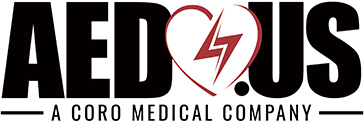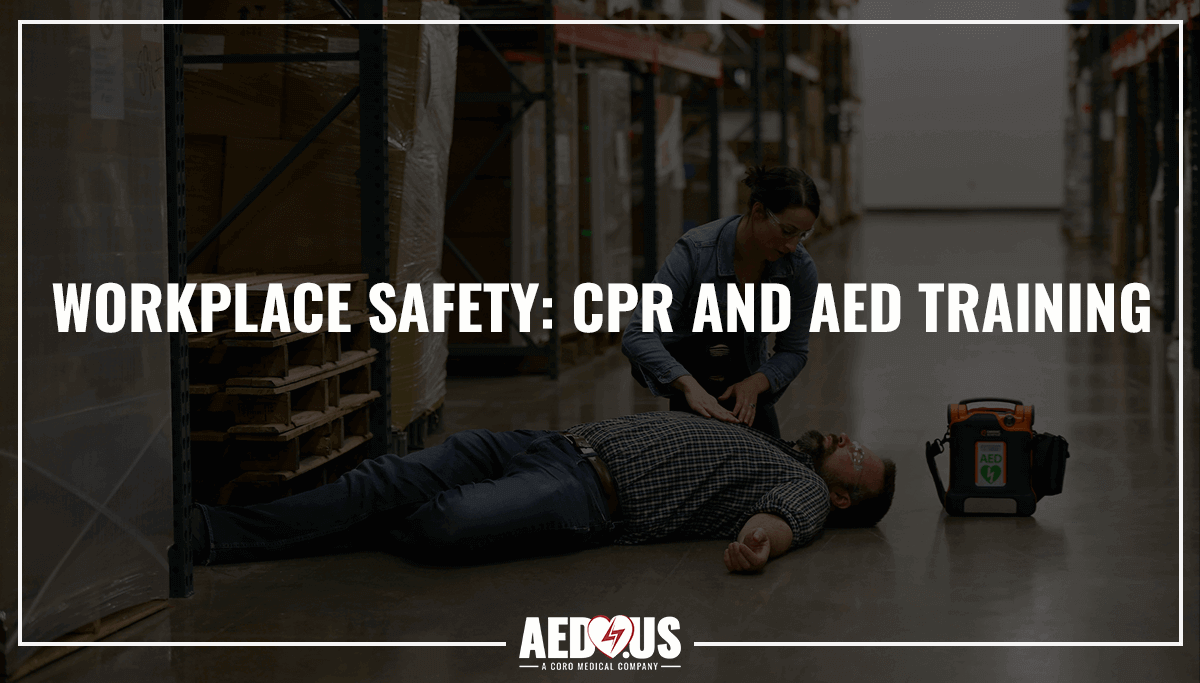Does your employer offer CPR and AED Training?
Does your workplace have an AED onsite?
Who would help you if you went into Cardiac Arrest?
June is CPR and AED Awareness Month, and we are focusing on opportunities where shared knowledge and training could help save the lives of Sudden Cardiac Arrest (SCA) victims.
- SCA remains the leading cause of death in the U.S. It can strike anyone of any age, race, or gender.
- According to the American Heart Association (AHA), about 350,000 people will experience out-of-hospital sudden cardiac arrest every year.
- Approximately 10,000 of these events occur in the workplace.
- And 90% of these people die because they do not receive immediate assistance.
Cardiac Arrest, an electrical malfunction of the heart when the heartbeat becomes irregular, interrupts the normal flow of oxygenated blood to the brain and other organs. A victims’ survival depends on a loved one or good Samaritan calling 911 and starting CPR chest compressions immediately to keep their blood flowing. Performing CPR before paramedics arrive helps double a person’s chances of staying alive. And a victim’s chance of survival decreases by 10% every minute that CPR is not administered. When we are at work, we owe it to our coworkers and customers to prevent on-the-job injuries and help in the event of an emergency. However, the AHA found that out of 2,000 employees interviewed, 55% have never been offered First Aid, CPR and AED Training from their employer, and only 50% could locate an AED at work. Unfortunately, many of us live with a false sense of security, believing or hoping that there will be someone onsite who is trained and qualified to help us before EMS or paramedics arrive. The use of an Automated External Defibrillator (AED) to shock the person’s heart back into a normal rhythm, is the ONLY other intervention to save someone who has gone into cardiac arrest. Another US/Canadian study of out-of-hospital cardiac arrests, focused on a subgroup: those that occurred in public, were witnessed by bystanders, and were shocked by an AED. Their research showed that about 66% of these people survived to hospital discharge, which proved that bystander and coworker intervention is critical in assisting a cardiac arrest victim. I speak with quite a few people every day, that are calling in for their work, looking to replace pads or batteries on their AED. I have found that, unfortunately, many people I speak with have never taken a course in CPR, or know how to use their AED. We like to say that obtaining an AED is only one step when preparing your workplace for sudden cardiac arrest. Taking it one step further and training your employees in First Aid, CPR and AED use will guarantee everyone knows where the AED is located, how to use it when the time comes, and will empower them to help save someone’s life if called upon, whether it is at work, at home, or out in public. AED.US offers CPR and AED Use, First Aid, and Bloodborne Pathogen Training online or at your chosen location for groups of 5 or more. Pricing includes an AHA certified Instructor, class training materials and supplies, and certificates for participants. Please call us to schedule your next training session at 1-800-695-1209.
Sources
AHA. “American Heart Association.” https://www.heart.org/en. 11 June 2020.
 Written by Blaire Czarniecki
Written by Blaire Czarniecki
Customer Service Director
Fact checked by Phillip Woods, BA, NREMT-P, FP-C
Blaire attended the University of Tennessee where she graduated with a Bachelor of Science in Human Ecology- Child and Family Studies. She has been in the Automated External Defibrillator (AED) industry for over eight years and is the Director of Customer Service for Coro Medical. Blaire is also an American Red Cross-certified CPR/AED/First Aid Instructor, highly trained by each manufacturer on their specific AEDs, and knowledgeable regarding ALL State AED regulations and legislation.
“I know that every day I come to work, I am playing a part in saving someone’s life. I am passionate about these devices and am always looking for new and innovative ways to spread awareness and knowledge about Sudden Cardiac Arrest (SCA). I look forward to the day when everywhere I go, I will see an AED—when SCA will no longer take any lives.”
Last updated June 11, 2020






